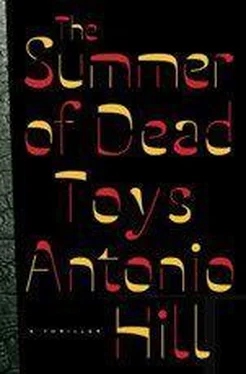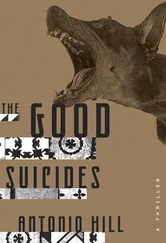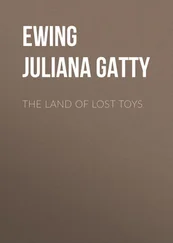Antonio Hill - The Summer of Dead Toys
Здесь есть возможность читать онлайн «Antonio Hill - The Summer of Dead Toys» весь текст электронной книги совершенно бесплатно (целиком полную версию без сокращений). В некоторых случаях можно слушать аудио, скачать через торрент в формате fb2 и присутствует краткое содержание. Жанр: Триллер, на английском языке. Описание произведения, (предисловие) а так же отзывы посетителей доступны на портале библиотеки ЛибКат.
- Название:The Summer of Dead Toys
- Автор:
- Жанр:
- Год:неизвестен
- ISBN:нет данных
- Рейтинг книги:4 / 5. Голосов: 1
-
Избранное:Добавить в избранное
- Отзывы:
-
Ваша оценка:
- 80
- 1
- 2
- 3
- 4
- 5
The Summer of Dead Toys: краткое содержание, описание и аннотация
Предлагаем к чтению аннотацию, описание, краткое содержание или предисловие (зависит от того, что написал сам автор книги «The Summer of Dead Toys»). Если вы не нашли необходимую информацию о книге — напишите в комментариях, мы постараемся отыскать её.
The Summer of Dead Toys — читать онлайн бесплатно полную книгу (весь текст) целиком
Ниже представлен текст книги, разбитый по страницам. Система сохранения места последней прочитанной страницы, позволяет с удобством читать онлайн бесплатно книгу «The Summer of Dead Toys», без необходимости каждый раз заново искать на чём Вы остановились. Поставьте закладку, и сможете в любой момент перейти на страницу, на которой закончили чтение.
Интервал:
Закладка:
“You’re lucky that this one’s here.” Baldy looks at his watch. “Four days: next Tuesday we’re coming to collect.”
Aleix nods because he can’t do anything else. He feels a hand resting on his shoulder and it helps him get up. He leans on Rubén, who looks wounded.
“Sorry, man,” he whispers in his ear. And Aleix realizes that he means it. Despite having to drive him to this trap, he’s worried about him.
“Take him home,” Baldy tells him. “He already knows what he has to do.”
Rubén grabs hold of his shoulders and brings him to the car. Outside, Aleix has to stop: his stomach is churning, his eyes streaming. And what’s worse, he’s weighed down by the fear of not knowing how to get out of this.
In the kitchen, Leire drank the glass of water slowly while she wondered how to broach the subject. Gina watched her with a blank expression. There was something behind it, something Leire discerned as much in the bitter tears from before as in her apathetic expression now.
“Do you have a photo of Marc?” she asked in a friendly tone. “I’d like to see what he looked like.” It was a shot in the dark, but it worked. Gina relaxed and nodded.
“Yes, I have them in my room.”
They went upstairs to the room and Gina closed the door.
She sat down at the computer and typed rapidly.
“I have lots on Facebook,” she said. “But these are from San Juan. I didn’t remember I’d taken them.”
They were improvised photos. The pizzas, the drinks, the traditional pine-nut cake. There were a couple of Aleix, but the majority were of Marc. Hair closely shaven, a sea-blue shirt with white numbers, and faded jeans. A normal boy, handsome-ish,but too serious for being at a party. Leire looked at Gina’s face as much as at the photos, and if she had harboured any doubt that the girl was in love, it dissolved immediately.
“You looked beautiful.” And it was true. It was evident that the girl had dressed up for that night. Leire imagined her dressing to please him. And she’d ended up drunk and alone, after vomiting in the bathroom. The question rose to her lips without thinking: “He’d met another girl, hadn’t he? In Dublin, maybe.”
Gina instantly tensed up and minimized the screen. But her face betrayed the answer.
“Wait.” A sudden memory came to Leire: Marc’s corpse on the ground of the patio, dried blood on the back of his head, jeans, trainers. . And yes, she was sure, a light green polo shirt, nothing like the blue T-shirt. “Did he change his clothes?” Aleix had told her, “If all of a sudden you don’t know how to answer, say you don’t remember.” Gina tried to feign confusion. “Why do you ask?”
“The clothes he was found in weren’t the same as the ones he’s wearing in these photos.”
“No? To be honest, I don’t remember.” Her knee was trembling; she couldn’t stop it. She stood up and went toward the door. The gesture was unmistakable: the conversation was over.
The old Citroën stopped on the same corner where it had picked Aleix up a few hours before. They hadn’t spoken throughout the whole journey: Aleix because he could barely pronounce a word, Rubén because he had nothing to say.
“Wait a minute,” stammered Aleix.
The driver turned off the engine. He stayed silent. Rubén lit a cigarette.
“These guys are serious,” he said, not looking at him. “This
time there’s a lot of money at stake, man. You have to get the money somehow.”
“You think I don’t know that? Shit, Rubén!”
“Get the dough, man. Ask your folks, your friends, your girlfriend. . She’s well off isn’t she? If one of my friends needed four thousand euros, I’d scrape it from under a stone. I swear.”
Aleix sighed. How could he explain to Rubén that it was exactly those who had the most money who were the most reluctant to let it go?
The smoke was drifting out of the open window, but it left a faint odor in the car. Aleix thought he was going to vomit. “Are you OK?”
“I don’t know.” He stuck his head out in search of air, a pointless gesture in this heat. He inhaled deeply anyway.
“Listen.” Rubén had thrown the butt into the street. “I want you to know something: my head is on the line. If these people come to believe that you’ve kept. . you know. . They’re in a different league, man. I told you.”
True. The deals between Aleix and Rubén went back a year, and they’d started almost as a game: the possibility of getting some free lines in exchange for moving part of the merchandise in circles Rubén couldn’t access. Aleix had enjoyed doing it: it was a way of breaking the rules, taking a small step on the other side. And when, weeks back, in light of the fact that business was booming, Rubén had proposed increasing the volume of sales courtesy of these new colleagues, he hadn’t given it a second thought. On the night of San Juan he was carrying enough to liven up half the city’s parties.
“Fuck, how many times do I have to tell you? Marc got pissed off with me and threw it down the toilet. I couldn’t do anything. D’you think I’d be putting up with all this if I could help it?”
“Why did you push him?”
The pause was too tense: like a rubber band stretched to its limit.
“What?”
Rubén looked away.
“I went looking for you, man. San Juan night. I knew where you were, so when I got tired of calling you I took the motorbike and I stood outside your friend’s house.”
Aleix looked at him, astonished.
“It was late, but the attic light was on. You could see it from the other side of the railings. Your friend was at the window, smoking. I called your mobile again and I was leaving when. .”
“What?”
“Well, from where I was I’d swear someone pushed him. He was still and suddenly he catapulted forwards. . And I seemed to see a shadow behind. I didn’t stay around to check. I grabbed the bike and got the hell out of there. Then, the following day, when you told me what had happened, I thought maybe it was you.”
Aleix shook his head.
“My friend fell from the window. And if you saw anything else it’s because you were out of your mind that night. Or weren’t you?”
“Well, it was San Juan. .”
“Whatever, best you don’t say you were around here.” “Fine.”
“Listen, do you have. .?”
Rubén exhaled.
“If those idiots hear that I’ve given you some they’ll kill me.” Rubén rapidly prepared two lines on an empty plastic CD case. He passed it to Aleix, who snorted the first greedily. He looked at him sideways before giving it back.
“Take the other one as well,” Rubén told him as he lit another cigarette. “I have to drive. And today you need it.”
11
Last visit of the day, thought Héctor as the car stopped just in front of the Castells’ house. One more and he could go home and forget all about it. Shelve this absurd favor and focus on what really mattered. What’s more, Savall would be happy for once; he would arrange a meeting with the boy’s mother, tell her it had all been an unfortunate accident and they’d move on. During the journey, his companion had told him the detail of the T-shirt and her reinforced belief that Gina Martí wasn’t telling them the whole truth. He’d made signs of agreeing, although he thought, without saying it aloud, that lying wasn’t the same as pushing a childhood friend out the attic window. A window which was visible now, above the creeper-covered railings. Héctor looked toward it and squinted: from that point to the ground was a good thirty-five or thirty-six feet. Where on earth did this custom of kids doing dangerous stunts come from? Was it out of boredom, a desire for risk, or simple irresponsibility? Maybe an equal amount of all three. He shook his head, thinking of his son entering adolescence, that awkward age plagued by stereotypes, during which he, as a father, could only arm himself with patience and hope that everything he had tried to impart in the past might have some effect in offsetting the hormonal turmoil and congenital stupidity of those years. Marc Castells was almost twenty when he fell from that window. Héctor kept his eyes fixed on it and realized he was overwhelmed by the sudden fear he’d felt at other times when confronted by absurd deaths: accidents that could have been avoided, tragedies that should never have happened.
Читать дальшеИнтервал:
Закладка:
Похожие книги на «The Summer of Dead Toys»
Представляем Вашему вниманию похожие книги на «The Summer of Dead Toys» списком для выбора. Мы отобрали схожую по названию и смыслу литературу в надежде предоставить читателям больше вариантов отыскать новые, интересные, ещё непрочитанные произведения.
Обсуждение, отзывы о книге «The Summer of Dead Toys» и просто собственные мнения читателей. Оставьте ваши комментарии, напишите, что Вы думаете о произведении, его смысле или главных героях. Укажите что конкретно понравилось, а что нет, и почему Вы так считаете.












